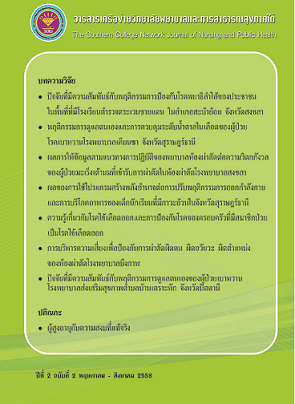พฤติกรรมการดูแลตนเองและการควบคุมระดับน้ำตาลในเลือดของผู้ป่วยโรคเบาหวาน โรงพยาบาลเคียนซา จังหวัดสุราษฎร์ธานี
คำสำคัญ:
การดูแลตนเอง, ความสามารถในการควบคุม, ระดับน้ำตาลในเลือด, โรคเบาหวาน, Self-care Behavior, Diabetes Mellitus, Bloodsugar Controlบทคัดย่อ
การวิจัยนี้เป็นการวิจัยเชิงสำรวจ เพื่อศึกษาพฤติกรรมการดูแลตนเอง ความสามารถในการควบคุมระดับน้ำตาลในเลือด ความสัมพันธ์ระหว่างพฤติกรรมการดูแลตนเองกับความสามารถในการควบคุมระดับน้ำตาลในเลือด ตลอดจนการเกิดโรคแทรกซ้อน และปัญหาอุปสรรคในการควบคุมระดับน้ำตาลในเลือดของผู้ป่วยโรคเบาหวาน กลุ่มตัวอย่างเป็นผู้ป่วยโรคเบาหวานชนิดที่ 2 ที่มารับการรักษาที่แผนกผู้ป่วยนอกโรงพยาบาลเคียนซา จังหวัดสุราษฎร์ธานี จำนวน 350 คน ซึ่งได้จากการสุ่มตัวอย่างแบบเป็นระบบ(ตามลำดับผู้รับบริการ) เครื่องมือที่ใช้คือ แบบสัมภาษณ์ และแบบบันทึกการเจ็บป่วย ซึ่งได้ผ่านการตรวจสอบความตรงตามเนื้อหาจากผู้ทรงคุณวุฒิ และหาค่าความเชื่อมั่นด้วยวิธีสัมประสิทธิ์แอลฟ่าของครอนบาคได้ค่าความเชื่อมั่น เท่ากับ .81 ทำการเก็บข้อมูลระหว่างเดือนกันยายน ถึงตุลาคม พ.ศ. 2557 วิเคราะห์ข้อมูลโดยใช้สถิติเชิงพรรณนา และ Simple Logistic Regression Analysis
ผลการวิจัยพบว่า ผู้ป่วยโรคเบาหวาน ร้อยละ 63.7 มีพฤติกรรมการดูแลตนเองในระดับปานกลางทั้งนี้ พฤติกรรมการดูแลตนเองที่พบมากว่ามีการปฏิบัติที่ไม่ถูกต้อง คือการจำกัดปริมาณอาหารในแต่ละมื้อเพื่อป้องกันมิให้ตนเองอ้วน การรับประทานผักในปริมาณที่เพียงพอต่อวัน และเมื่อเกิดความเครียดมีการจัดการกับความเครียดไม่ถูกต้อง และการควบคุมน้ำหนักตัวไม่ให้เพิ่มขึ้น ผู้ป่วยโรคเบาหวานมีความสามารถในการควบคุมระดับน้ำตาลในเลือดได้ ร้อยละ 32.0 พฤติกรรมการดูแลตนเองมีความสัมพันธ์
เชิงบวกกับความสามารถในการควบคุมระดับน้ำตาลในเลือดของผู้ป่วยโรคเบาหวานอย่างมีนัยสำคัญทางสถิติ (Exp (B) = 1.026, p=.026) สำหรับการเกิดโรคแทรกซ้อนของผู้ป่วยโรคเบาหวาน พบว่า มีการเกิดโรคแทรกซ้อน ร้อยละ 62.3 โดยเกิดโรคความดันโลหิตสูงร้อยละ 44.0 โรคเหน็บชา ร้อยละ 36.3นอกนั้นเกิดเบาหวานขึ้นตาหรือจอตาเสื่อม แผลเรื้อรัง โรคหัวใจ โรคไตวาย และไขมันในเลือดสูง ร้อยละ9.1, 8.9, 6.3, 6.0, และ 0.9 ตามลำดับ ปัญหาอุปสรรคในการควบคุมระดับน้ำตาลในเลือดที่สำคัญคือเรื่องการออกกำลังกาย เช่น สภาพร่างกายไม่พร้อม ไม่มีเวลา และไม่ใส่ใจออกกำลังกาย พบร้อยละ 13.9
ดังนั้น ควรส่งเสริมให้ผู้ป่วยโรคเบาหวานปรับเปลี่ยนพฤติกรรมการดูแลตนเองเพื่อควบคุมโรคให้อยู่ในสภาวะที่เหมาะสม และป้องกันภาวะแทรกซ้อนที่จะเกิดขึ้น
Self-Care Behaviors and Blood Sugar Control among Patients with Diabetes Mellitus at Khiensa Hospital, Suratthani Province
This descriptive research aimed to studyself-care behavior, blood sugar control, the relationship between self-care behavior and blood sugar control, complication of the disease, as well as problems and barriers regarding blood sugar control. Sample was 350 patients with Diabetes Mellitus type 2 who attended the outpatients department in Khiensa Hospital, Suratthani Province. Systemic random sampling was used. Research instruments were an interview form, illness record, and questionnaire. Content validity of the instruments was confirmed by experts. Reliability of the instruments was validated using Cronbach’s alpha coefficient, yielding a value of .81. Data were collected during September–October 2014 and analyzed by using descriptive statistics and simple logistic regression analysis.
The results showed that the majority of the sample (63.7%) had a moderate level of self-care behavior. The self-care behaviors that the patients often practiced inappropriately were limiting the amount of food in each meal to prevent gaining weight, insufficient eating of vegetables per day, lack of exercise or inappropriate exercise, body weight control, and stress management. There were 32 percent of the diabetes patients who could control blood sugar level. The correlation of self-care behaviors and blood sugar control was statistically significant (Exp (B) = 1.026, p=.026). The majority of the patients (62.3%) had complications. The complications found were hypertension (44%), numbness (36.3%), retinal degeneration (9.1%), chronic ulcer (8.9%), heart disease (6.3%), renal failure (6.0%), and hyperlipidemia (0.9%). The major problems and barriers of uncontrollable blood sugar (13.9%) were lack of exercise because of physical condition, lack of time and interest in exercise.
The findings suggest that the proper self-care behaviors should be promoted among patients with Diabetes Mellitus in order to control blood sugar and further prevent complications of the disease.
ดาวน์โหลด
เผยแพร่แล้ว
ฉบับ
ประเภทบทความ
สัญญาอนุญาต
1. บทความหรือข้อคิดเห็นใด ๆ ที่ปรากฏในวารสารเครือข่าย วิทยาลัยพยาบาลและการสาธารณสุขภาคใต้ ที่เป็นวรรณกรรมของผู้เขียน บรรณาธิการหรือเครือข่ายวิทยาลัยพยาบาลและวิทยาลัยการสาธารณสุขภาคใต้ ไม่จำเป็นต้องเห็นด้วย
2. บทความที่ได้รับการตีพิมพ์ถือเป็นลิขสิทธิ์ของ วารสารเครือข่ายวิทยาลัยพยาบาลและการสาธารณสุขภาคใต้








